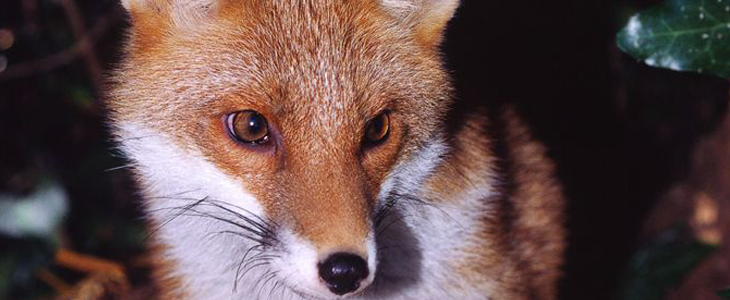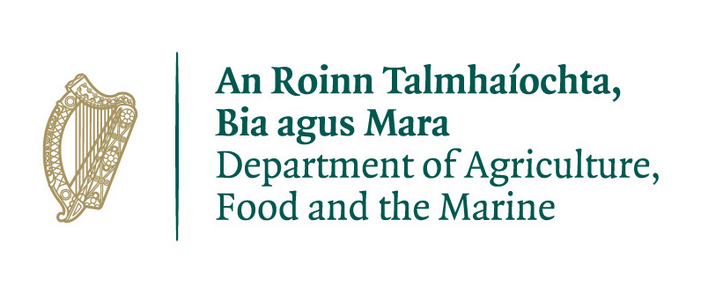
Fox
Fox - Vulpes vulpes
Foxes are resilient creatures as they will scavenge for food as well as hunting their own prey. They help keep rabbit numbers under control in rural areas and farmland, which in turn reduces crop disease and destruction. They are considered pests by some as they prey on domesticated poultry and on ground nesting birds. They are considered a threat during the lambing season although foxes are happier to scavenge dead lambs instead of actively hunting them.
Hunting foxes with dogs is still permitted at certain times of the year. They are also vulnerable to road collisions with traffic as they are territorial animals and traverse these routes regularly. Because foxes are carrion eaters, they are susceptible to pesticide accumulation which travels up the food chain. Foxes are also prone to sarcoptic mange which causes fur loss due to scratching at the embedded mites.
Foxes are not a protected species under the Wildlife Acts, however, they are provided with legal protection from cruelty.
Fox Crimes
The fox is not a protected species under the Wildlife Acts 1976 to 2012, which basically means that you can hunt and kill it without having to apply for a licence or permission to do so.
The Wildlife Acts do however make provisions that wild animals and wild mammals (which includes the fox) may not be hunted by various means.
Accordingly the following provision of the Wildlife Acts makes it unlawful to:
- Hunt a fox by means of a trap, snare or net unless they stand approved for the purposes of this section by virtue of regulations under this section (see Wildlife Act 1976 (Approved Traps, Snares and Nets) Regulations 2003)
- Hunt a fox by means of line, hook, arrow, dart, spear or similar device however propelled or any electrical device which is calculated or likely to cause death, unconsciousness or bodily injury to such mammal
- Hunt a fox by means of any poisonous, poisoned or stupefying bait
- Hunt a fox using an electrical or other instrument or device (including recording apparatus) emitting sound
- Hunt or disturb for the purpose of hunting a fox by means of mechanically-propelled vehicle, vessel or aircraft, whether it is being so propelled or is stationary
- Enter on any land with a firearm or other hunting equipment for the purpose of hunting a fox without the permission of the owner or the occupier or some other person entitled to enjoy sporting rights over the land
- Shoot foxes in state owned Nature Reserves or National Parks. It is the policy of the Department of Arts, Heritage and the Gaeltacht not to allow hunting over nature reserves and other lands acquired for conservation purposes
The European Communities (Birds and Natural Habitats)(Restrictions on the Use of Poison Bait) Regulations 2010 further restricts the use of poison:
Regulation 4
- It shall be an offence for a person to place, caused to be placed or permit to be placed or have with him or her any poisoned or anaesthetic bait that is animal or contains animal substance or other animal derivative in any place to capture, kill, poison, stupefy, anaesthetise, harm or injure or where it is likely to capture, kill, poison, stupefy, anaesthetise, harm or injure:
any species referred to in Article 1 of the Birds Directive, or
any species of wild fauna listed in Annexes 1V(a) and V(a) to the Habitats Directive
except in accordance with a licence
Foxes are not species referred to in Article 1 of the Birds Directive or in the Annexes to the Habitat Directive. However, it does share the same habitat of most of these species and if a meat-based poison was laid to kill foxes it would also be likely to kill species referred to in Article 1 of the Birds Directive and the Annexes to the Habitat Directive and is therefore an offence
Issues of cruelty to animals (including Foxes) are dealt with in the provisions of the Animal Health and Welfare Act 2013:
Section 12
- Makes it an offence to – (a) do, or fail to do, anything or cause or permit anything to be done to an animal that causes unnecessary suffering to, or endangers the health and welfare of an animal, or (b) neglect, or be reckless, regarding the health and welfare of an animal
In this Act “Unnecessary Suffering” means, in relation an animal, pain, distress or suffering (whether physical or mental) that in its kind or degree, or in its object, or in the circumstances in which it occurs, is unreasonable or unnecessary
Issues to do with firearms and weapons are dealt with under the Firearms Acts.
Revocation of the Firearm Certificate can be sought if the weapon (Firearm within the meaning of the Act) was being used “for a purpose not authorised” under the Firearms Act.
Lamping of Foxes
(The use of lamps, mirrors, dazzling equipment etc., for the purposes of hunting)
The use of a mechanically propelled vehicle may not be used for the purposes of hunting any wild animal, whether the vehicle is stationary or moving. Therefore a hunter must not be in any vehicle while lamping.
The shot should be taken from inside the field and then at a distance of not less than 60 feet (18.3metres) from the road and shooting away from the direction of the road.
Under the Wildlife Acts, the definition of “Hunt” includes the words “Search for” (which the person is doing when lamping) and “Trap or Shoot by any means”
Therefore; legally, lamping and shooting would both be considered as Hunting under the Wildlife Acts”
Example: it would be an offence under section 44 of the W/L Acts (trespass) for a person who not being the owner or occupier of land was using a lamp to search for foxes and with a gun for shooting them on the land without the permission either of the person who is the owner or the occupier of the land or other person entitled to enjoy sporting rights over the land.
Lamping land for foxes from the road can be considered hunting/trespass and subject to section 44
Recording evidence at the Crime Scene
Assessing whether a criminal offence has taken place may not always be straight forward and other possibilities such as natural deaths, predation and legal hunting should be considered.
If you come across a wildlife crime scene or a dead bird or object that may be related to a wildlife crime, every piece of information is – or might be – important, but it needs to be recorded properly and accurately for the authorities to have a chance of prosecuting an offender.
Before you do anything else it is very important that:
- You do NOT put yourself in danger by approaching anyone you suspect of committing a crime – they may be violent and/or aggressive.
- You do NOT touch any dead birds or animals. They may be poisoned baits or victims of poisoning. Many poisons (e.g. Carbofuran) are extremely dangerous to us as well as wildlife in even very small amounts and can be absorbed through the skin.
- You do NOT disturb the scene by walking around unnecessarily – small pieces of evidence (cigarette ends, footprints, the marks left by a spade etc) may be lost or trampled into the mud or grass.
- You do NOT move any items at the scene – unless asked to do so or an animal or human”s welfare is/may be compromised by leaving it at the scene.
- You do NOT mark the site (e.g. with a white plastic bag) Although being able to see a marker from a distance might sound like a good idea, it will also alert an offender that someone has been at the site and they might go back and remove evidence.
- You do NOT do anything illegal yourself – leave crime to the criminals!
Record the date and time
- Record the transport
Do this as soon as possible, as suspects can be traced from the registration number
Photograph/write down any vehicle registration numbers that are or might be related to the incident. It is legal to record a registration number if you suspect that the vehicle has been or may be used in a crime. - Record the person
Recording the offender’s face is important of course, but their clothing, the bags they’re carrying, the equipment they’re using are all important too. - Record the scene
Take photographs or video of the scene using a mobile phone or camera etc (or make as accurate a sketch as possible). - If possible try to cover any items, perhaps with vegetation, to make them safe; but make sure you don’t disturb the crime scene in the process!
- If photographing an object, try to put something beside it for scale (e.g. a coin or notebook) providing it won’t disturb the crime scene.
- Record the location
It is particularly important to record locations accurately (apps that provide GPS data are available for most smartphones)
In an urban area note the address or a description of the location. In the countryside take wide angle photographs of any landmarks; a tree, a distinctive fence line, a hill. - Even if in doubt take a photograph and email it to the National Parks and Wildlife Service nature.conservation@chg.gov.ie
Reporting a fox crime
To report suspected illegal fox activity contact An Garda Síochána:
If the crime is in progress or about to happen, or if the offender is still at the scene or has just left call 999 or 112
If the event is finished then either call your local Garda Station (Garda Stations Directory) or the Garda Confidential Telephone Number 1800 666 111
If you suspect the illegal fox activity is a breach of the Wildlife Act contact National Parks & Wildlife Service
Tel: 01-888 3242 or LoCall 1890 383 000
For a pdf of contact numbers for your local NPWS Conservation Ranger click HERE
[Although it will assist the NPWS and Gardaí if you provide as much information as possible, you do not have to give your name if you ring to report an incident.]
| If the fox is alive and is injured, also call a wildlife rehabilitator/vet from the contacts page of Irish Wildlife Matters | Irish Wildlife Matters |
| If you witness an act of animal cruelty involving a fox please also contact the ISPCA’s cruelty helpline number 1890 515515 | Irish Society for the Prevention of Cruelty to Animals (ISPCA) |
